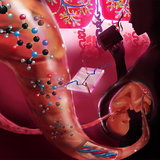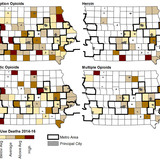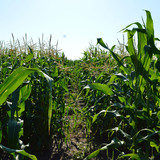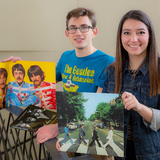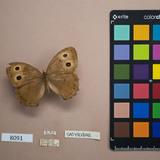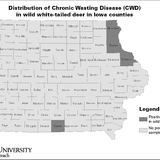News Archive
Friday, February 22 2019
-
CYstarters businesses make progress with patents, prototypes
Maintaining momentum after CYstarters is not always easy as entrepreneurs return to class or move on to a full-time job. The progress made after the 10-week summer accelerator ends exemplifies their dedication to get their product to market.
-
Iowa State events planned to shed light on body image issues, eating disorders
Body Image and Eating Disorder Awareness Week at Iowa State University begins Monday, Feb. 25. The week includes a lecture by a writer and eating disorder recovery coach, as well as events across campus drawing attention to issues of body image, discrimination and eating disorders.
-
‘White Fragility’ author will discuss racism, social justice while at Iowa State
A scholar on race issues, particularly how white Americans deal with race and privilege, will speak at Iowa State University on Feb. 26.
-
Engineers develop placenta-on-a-chip to study caffeine transport from mother to fetus
Iowa State's Nicole Hashemi has used her expertise in microfluidics to lead development of a device that models a human placenta. She and her research team have used the "placenta-on-a-chip" to study transport of caffeine from the mother, across the placental barrier, to the fetus. The journal Global Challenges has just published a paper describing the device and reporting on the caffeine study.
-
Tinkers, at heart of student free speech, will mark 50th anniversary of landmark SCOTUS case at Iowa State
In 1965, three Des Moines teenagers wore black armbands to school to protest the Vietnam War. Their suspension led to a 1969 U.S. Supreme Court decision that was a turning point for students’ First Amendment rights. On Feb. 25, siblings Mary Beth Tinker and John Tinker will discuss the significance of their case at Iowa State University.
-
Municipal spending outpaces population, income growth in both growing, shrinking counties
While it’s not surprising that growing counties across the U.S. are increasing total spending as well as capital spending, a new Iowa State University study shows shrinking counties are doing the same. This increased spending puts shrinking counties in an exacerbated downward cycle.
-
Climate change increases potential for conflict and violence
Images of extensive flooding or fire-ravaged communities help us see how climate change is accelerating the severity of natural disasters. Iowa State researchers say what is not as clear is the indirect effect of these disasters and rapid climate change on violence and aggression. They have identified three ways climate change will increase the likelihood of violence.
-
Prescription opioid overdose deaths falling in Iowa; synthetics and heroin spike new concern
Stronger regulation and efforts to prescribe fewer opioids have helped reduce overdose deaths in Iowa, but an Iowa State University researcher says another crisis is on the horizon. David Peters, associate professor of rural sociology, expects in the next two to three years the state will see an uptick in overdose deaths from heroin and synthetic opioids, such as fentanyl.
-
Data mining brings new clarity to plant breeding, according to new Iowa State University study
Data mining methods that draw on computer science and statistics can bring new clarity for plant scientists trying to design better crop varieties, according to newly published research from an ISU agronomist. The study outlines several data management approaches that can help plant breeders predict the traits of potential hybrids faster and cheaper than growing and testing the plants.
-
Iowa State students come together to study the Beatles
Jennifer Leptien translated her lifelong passion for the Beatles into a learning opportunity for Iowa State University students. Each spring, students enroll in Leptien and Jason Chrystal’s one-credit honors seminar for a deep-dive into Beatlemania. Over spring break, they’ll travel to Liverpool and London to see where the Fab Four got their start.
-
Crowdsourcing effort aims to unearth new discoveries in “lost” collection at Iowa Lakeside Laboratory
Citizen scientists can contribute to an effort to enter thousands of preserved organism samples from the Iowa Lakeside Laboratory into an easily searchable database. An ISU scientist overseeing the project said there’s no telling what kind of discoveries may await among the various specimens of plants, insects and animals.
-
Black History Month events planned at Iowa State
Celebrate Black History Month at Iowa State University with a variety of events recognizing and honoring the achievements and contributions of African Americans. Events range from film screenings to workshops to the annual Iowa State Conference on Race and Ethnicity (ISCORE).
-
Giving high school students the tools to question classic literature
Generations of students have read Shakespeare and Hemingway for high school literature class and Jeanne Dyches, assistant professor in Iowa State University’s School of Education, would like students to question that tradition. Assigning these texts without questioning issues of race or gender may exclude students who do not see themselves in the text, and make them feel their voices are not valued, she said.
-
ISU wildlife ecologist looks at the future of chronic wasting disease in Iowa deer
An ISU wildlife ecologist looks at the future of chronic wasting disease in Iowa deer after the recent confirmation of a case in Dubuque County. Chronic wasting disease, a neurological disorder that arises from misfolded proteins that affect the brains of deer, has been confirmed in four Iowa counties. There’s no evidence humans can contract the disease, but hunters are urged to have harvested deer tested if they suspect the disease is present, and no one should eat venison from infected deer.
-
Iowa State engineers use big data tools to assist Iowa DOT, improve highway safety
Researchers with Iowa State's Institute for Transportation are using artificial intelligence and machine learning tools to manage, sort and analyze the traffic data collected by the Iowa Department of Transportation. The idea is for researchers to use the latest computing tools to mine the huge data sets for useful information that could lead to safer roads.



